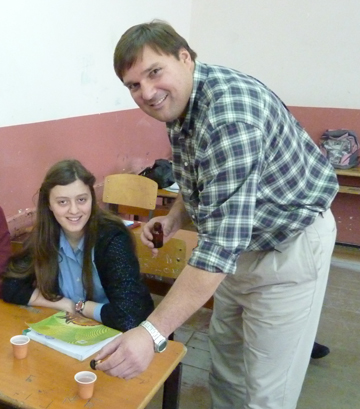Purdue Profiles: Jeffrey Nowak

Jeffrey A. Nowak, associate professor of science education at Indiana University-Purdue University Fort Wayne, helps students in Pizren, Kosovo, with physics and biology activities. (Photo provided)
Jeffrey A. Nowak has taken his love of teaching science, technology, engineering and math to the global stage.
Nowak, associate professor of science education at Indiana University-Purdue University Fort Wayne, has helped improve education systems in Macedonia and, most recently, in Kosovo through his work with the U.S. Agency for International Development (USAID). Nowak also serves as director of the Northeast Indiana Science, Technology, Engineering and Math Education Resource Center (NISTEM) in Fort Wayne.
How did you become involved in USAID?
I was recruited into USAID work by colleagues at Indiana University-Purdue University Indianapolis (IUPUI) and Indiana University in Bloomington, who were familiar with my work in science education.
In the summer of 2006, I began working with USAID in Macedonia, where I engaged in a project named PEP, or primary education project. Over the course of the project I made about a dozen trips to Macedonia to conduct workshops for teachers, create during- and after-school educational programs, and oversee the development of educational entrepreneurship standards for the country. As an outcome of my work in Macedonia, in 2010 I received another independent request to work in the Balkans -- in Kosovo.
What work have you done in Kosovo?
I was asked to help lead a new project in Kosovo named the basic education project, or BEP. I’ve already made three trips to Kosovo just in the past year, and the BEP project has provided me with some wonderful experiences.
Unique to Kosovo, I’ve been fortunate to be able to engineer and design the layout for the science labs and library in the “green school” there. The green school is a geothermal, solar-powered, state-of-the-art model school for the Balkans, funded largely by USAID. I designed the science labs and library as multipurpose spaces with modular furniture, wireless technologies and plenty of storage. In the labs, there is easy access to water and facilities so that students can complete a wide range of projects in those respective spaces.
I've also played the lead role in a television episode of “Classroom Makeover.” In a spin-off of the American show "Extreme Makeover: Home Edition," I led a rural community in an intensive, three-day renovation and modernization of a science classroom. The members of the community and students all came and partnered together and we had an amazing, albeit exhausting, time. The television show aired on Kosovar National TV last December.
What challenges have you encountered while working in the Balkans?
In general, there is a lack or absence of materials in science and mathematics classrooms. Middle school classrooms often have no equipment, and even in the high schools lab equipment is difficult to acquire.
To help with the issue, I do a lot with recyclable materials. For example, we use recyclable plastic bottles in a plethora of activities. When I needed a spout for a hot air balloon activity, the local metal smith created one for me. When Ziploc bags could not be found, we used small grocery bags. There is also a language barrier, of course, so when I present to a group I work through an interpreter – and some are better with science terminology than others. I’m constantly adjusting and adapting, but it's always a fun, rewarding experience.
What's the most rewarding part about this work?
It's tough to specify the most rewarding part. I enjoy the fact that while I am fulfilling a University mission – increasing our international presence and recognition -- I'm also getting to know the amazing people I'm partnering with overseas. The administrators, teachers, and the students I’ve helped have been absolutely wonderful. We remain in contact through Skype and email.
Another rewarding aspect is that the training I provide to facilitators is replicated in follow-up workshops to initiate countrywide educational reform. I’ve received many pictures and letters through email of students I’ve never met. They're engaging in activities from the trainings and they're stating how much they love what they are learning. I don’t think that as a teacher it can get much better than that.
What are some of your plans for the future?
On the international scale, independent of USAID, I'll be going to Bangladesh to meet with representatives from the Bangladesh Council of Scientific and Industrial Research, which is similar to our National Science Foundation. We'll be discussing a project to work with their teachers and students to improve science, technology, engineering and math education. I was also invited to be a part of a proposal recently submitted to USAID to complete work similar to PEP and BEP in Egypt.
